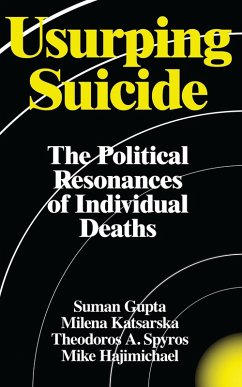Can an individual act of suicide be socially significant, or does it present too many imponderable features?
This book examines suicide like no other. Unconcerned with the individual dispositions that lead a person to commit such an act, Usurping Suicide focuses on the reception suicides have produced - their political, social and cultural implications. How does a particular act of suicide enable a collective significance to be attached to it? And what contextual circumstances predispose a politicised public response?
From Mohamed Bouazizi's self-immolation during regime change in Tunisia to Dimitris Christoulas's public shooting at a time of increased political upheaval in Greece, and beyond - this remarkable work examines how the individuality of the act of suicide poses a disturbing symbolic conundrum for the dominant liberal order.
This book examines suicide like no other. Unconcerned with the individual dispositions that lead a person to commit such an act, Usurping Suicide focuses on the reception suicides have produced - their political, social and cultural implications. How does a particular act of suicide enable a collective significance to be attached to it? And what contextual circumstances predispose a politicised public response?
From Mohamed Bouazizi's self-immolation during regime change in Tunisia to Dimitris Christoulas's public shooting at a time of increased political upheaval in Greece, and beyond - this remarkable work examines how the individuality of the act of suicide poses a disturbing symbolic conundrum for the dominant liberal order.









